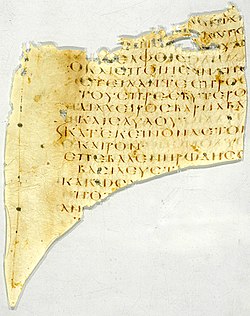Acts 11
Appearance
| Acts 11 | |
|---|---|
 Acts 11:29–12:2 on the recto side of Uncial 0244 (Gregory-Aland) from the 5th century. | |
| Book | Acts of the Apostles |
| Category | Church history |
| Christian Bible part | New Testament |
| Order in the Christian part | 5 |
Acts 11 is the eleventh chapter of the Acts of the Apostles in the New Testament of the Christian Bible. It records that Saint Peter defends his visit to Cornelius in Caesarea and retells his vision prior to the meeting as well as the pouring of Holy Spirit during the meeting. The book containing this chapter is anonymous but early Christian tradition uniformly affirmed that Luke composed this book as well as the Gospel of Luke.[1]
Text
The original text was written in Koine Greek. This chapter is divided into 30 verses.
Textual witnesses
Some early manuscripts containing the text of this chapter are:
- Codex Vaticanus (AD 325–350)
- Codex Sinaiticus (330–360)
- Codex Bezae (~400)
- Codex Alexandrinus (400–440)
- Papyrus 127 (5th century; extant verses 2–5, 30)
- Codex Laudianus (~550)
Locations
This chapter mentions the following places:

Verse 17
- [Simon Peter said to the assembly:] “If therefore God gave them the same gift as He gave us when we believed on the Lord Jesus Christ, who was I that I could withstand God?”[2]
Verse 18
- When they heard these things they became silent; and they glorified God, saying, “Then God has also granted to the Gentiles repentance to life.”[3]
Verse 26
- And when he (Barnabas) had found him (Saul or Paul of Tarsus), he brought him to Antioch. So it was that for a whole year they assembled with the church and taught a great many people.
- And the disciples were first called Christians in Antioch.[4]
- "Christians": This is the first mention of the term "Christian" in the New Testament—followed by second mention by Herod Agrippa II (Acts 26:28) and by Simon Peter in his first epistle (1 Peter 4:16)—where all three usages are considered to reflect a derisive element referring to the followers of Christ who did not acknowledge the emperor of Rome.[5]
See also
References
- ^ Holman Illustrated Bible Handbook. Holman Bible Publishers, Nashville, Tennessee. 2012.
- ^ Acts 11:17
- ^ Acts 11:18
- ^ Acts 11:26 NKJV
- ^ Wuest 1973, p. 19. The word is used three times in the New Testament, and each time as a term of reproach or derision. Here in Antioch, the name Christianos was coined to distinguish the worshippers of the Christ from the Kaisarianos, the worshippers of Caesar.
Sources
- Wuest, Kenneth Samuel (1973). Wuest's word studies from the Greek New Testament. Vol. 1. ISBN 978-0-8028-2280-2.
External links
- Acts 11 King James Bible - Wikisource
- English Translation with Parallel Latin Vulgate
- Online Bible at GospelHall.org (ESV, KJV, Darby, American Standard Version, Bible in Basic English)
- Multiple bible versions at Bible Gateway (NKJV, NIV, NRSV etc.)

